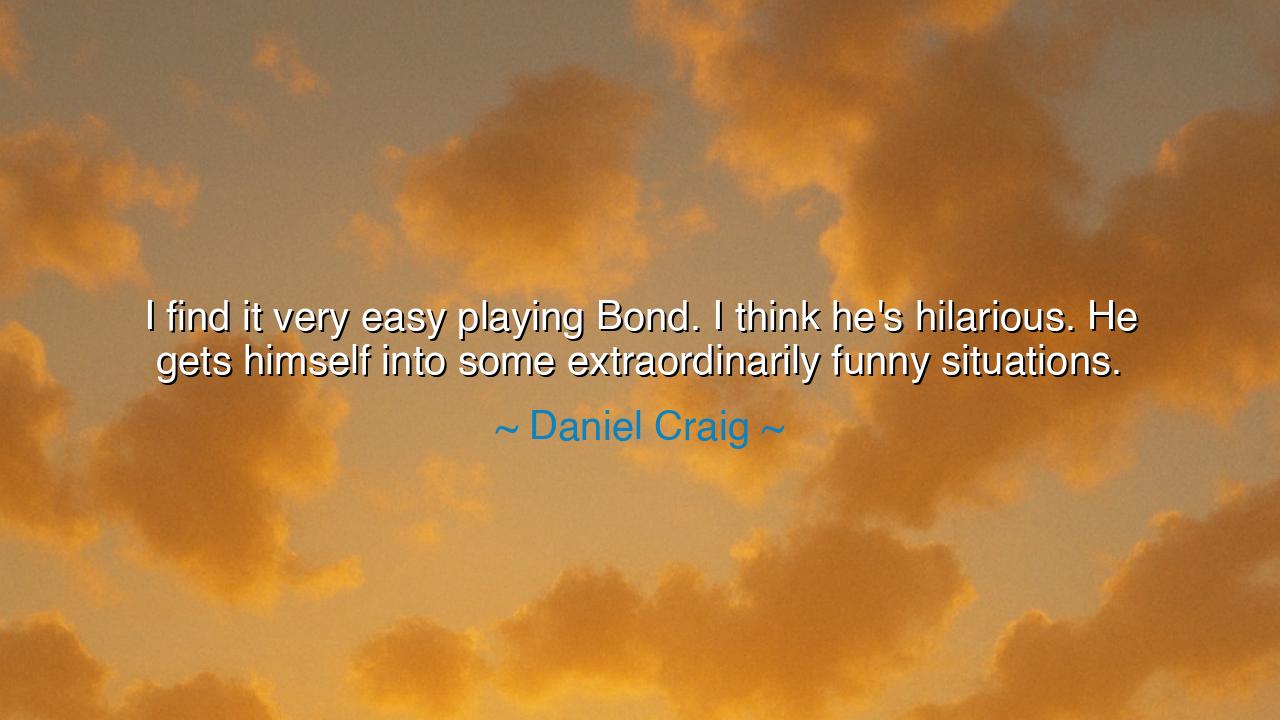
I find it very easy playing Bond. I think he's hilarious. He gets
I find it very easy playing Bond. I think he's hilarious. He gets himself into some extraordinarily funny situations.






“I find it very easy playing Bond. I think he’s hilarious. He gets himself into some extraordinarily funny situations.” Thus spoke Daniel Craig, the modern embodiment of the world’s most famous spy, and through his words he revealed a truth that lies beneath the surface of myth, glamour, and danger. For though James Bond is often remembered as the cold hero of espionage, the man of steel and precision, Craig saw something deeper—something profoundly human. He saw the absurdity in heroism itself, the quiet humor that hides within the chaos of courage.
To call Bond hilarious is not to mock him, but to recognize the strange comedy of fate that follows all who live at the edge of peril. The warrior who walks through fire must learn to laugh, for without laughter, the fire consumes him. In the same way, Craig’s Bond—bloodied, weary, yet unbroken—finds irony in the endless cycle of saving the world, surviving explosions, and wearing a tuxedo moments after chaos. To him, the spy’s life is not just thrilling—it is ridiculous, and that ridiculousness is what makes Bond both immortal and relatable. The funny situations are not moments of farce, but mirrors of life itself, where tragedy and humor intertwine like shadow and light.
This perspective is ancient in spirit. The Greeks understood that the hero and the fool are born from the same divine spark. In the tragedies of Euripides, the gods themselves often mocked mortals who took life too seriously, reminding them that even in glory there is folly. Likewise, the Stoic philosophers taught that the wise must find laughter even in suffering, for humor is a form of courage—the soul’s refusal to be broken by the absurdity of fate. When Daniel Craig calls Bond “hilarious,” he speaks with the same timeless understanding: that to survive life’s storms, one must not only fight but laugh.
Consider the tale of Winston Churchill, who in the darkest days of war faced annihilation with wit as sharp as any sword. He turned despair into humor, saying, “If you’re going through hell, keep going.” His laughter was not denial—it was defiance. In this same spirit, Bond’s smirk in the face of doom, his wry remark as explosions bloom behind him, becomes something sacred. It is not arrogance; it is endurance. To find the funny in danger is to deny fear its dominion. Craig’s interpretation of Bond reclaims this ancient heroism, one that does not hide behind stoicism, but reveals its humanity through irony.
To play Bond easily, as Craig says, is to understand this paradox—to hold both the myth and the man, the legend and the laughter. The ease comes not from lack of effort, but from alignment with truth. For Bond, at his heart, is not a superhuman machine of death, but a flawed soul who carries the weight of impossible duty with charm, humor, and grace. His extraordinary situations—the near-deaths, betrayals, and impossible escapes—reflect the trials we all endure, only heightened to mythic scale. Through his laughter and survival, we glimpse our own resilience made visible.
In this, there is a lesson for every mortal who walks through the labyrinth of life. We may not face villains or falling skyscrapers, but we too stumble into our own extraordinary situations—those moments of chaos, heartbreak, or absurd coincidence. We too must learn to see the humor in them, not to dismiss their seriousness, but to reclaim our power from despair. To laugh amid hardship is to say, “I am still free.” That is the spirit of Bond as Craig sees him—not invincible, but indomitable.
So, take heed, O listener: learn to find laughter in the storm. When life hurls its ironies and contradictions at you, meet them not with bitterness, but with the smile of one who understands that existence itself is a grand, unpredictable drama. Be as brave as the hero, but also as playful as the fool. For wisdom does not dwell only in solemnity—it lives also in the quiet chuckle that follows failure, the grin that rises from ruin.
And so, in Daniel Craig’s words, the myth of Bond becomes a parable for us all: that courage without humor becomes stone, but courage with laughter becomes art. The man who can laugh at the absurdity of his trials is already victorious, for he has conquered fear itself.






AAdministratorAdministrator
Welcome, honored guests. Please leave a comment, we will respond soon